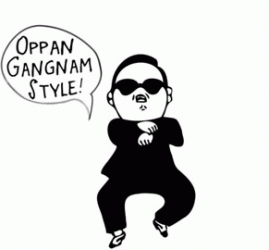- What is your answer to criticisms of K-pop masculinity?
As Korean K-pop music becomes more famous all around world, people are going to have a new concept of aesthetic: What is the real masculinity? In normal Korean males, they have grantee to serve the military, then they became real men. In K-pop industry, males are not necessarily stronger or dressing formal to follow in the traditional style. They can make up, act like a spoiled child or even dressing bonzer and become “Pretty boys”(Colette 2017). In my opinion, I think whatever the male’s style in K-pop right now, as long as they can contribute in K-pop and their fans, then they have masculinity
Male’s style in K-pop industry influences their fans as squeals of delight and excitement(Colette 2017). It means male idol’s style can let their fans become excited, then it is the masculinity and it is also their contribution for K-pop. For example, Colette Bennett said in his article “How male K-Pop idols are redefining masculinity”: “While K-pop may not suit the taste of many, its continued popularity in the U.S. means that hundreds of thousands of people are falling in love with a new kind of man, one we’re meeting for the first time through the music. It’s refreshing and exciting” (Colette 2017). So after K-pop explored in U.S, more fans get interested in the new kind of male. They actually changed their aesthetic and they even fall in love with the male who actually doing make up. And those male idols just did what they desire to do as: “It’s OK for me to dance, to sing, to enjoy who and what I am”(Colette 2017). Their realistic is a responsibility to K-pop industry and their fans. Whatever they look like, they are themselves and they can perform themselves in good attitude. It is the real concept of masculinity.
In 2009, the music video called Abracadabra by 2 pm had a total hit count of 1,150,000 on YouTube. It became the queen of the girls group mimickers(Jung 2010 p.164). It also proved people accepted 2pm’s performance as girls mimickers. However it did not mean they wanted become girls or they are gay. They just opened a new path of male’s aesthetic and a new style of K-pop music video. Those are all their achievement and I think their achievement let them become masculinity.
In conclusion, we should change our mind about how a male should be look like in K-pop industry. There’s no exactly rule that a male couldn’t make up or dressing in female style. Those are all their styles even features. We cannot say if a male who wear ear ring is not masculinity. We should focus on what they did for their fans and how they work hard for K-pop, this is their identification of masculinity.
References:
Jung, Sun. Korean Masculinities and Transcultural Consumption: Yonsama, Rain, Oldboy, K-Pop Idols. Hong Kong: Hong Kong University Press, 2011.
Colette,Bennett. “How Male K-Pop Idols Are Redefining Masculinity.” The Daily Dot. February 24, 2017. Accessed November 22, 2018. https://www.dailydot.com/upstream/k-pop-boy-bands-masculinity/.

